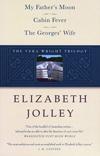The Vera Wright Trilogy
The Vera Wright Trilogy brings together Elizabeth Jolley’s three semi-autobiographical novellas; My Father’s Moon, Cabin Fever, and The Georges’ Wife. Set in England during the Second World War and it’s aftermath, the trilogy follows Vera on her journey from an adolescent nurse in a wartime hospital to a comfortably settled wife and mother in postwar Australia with a medical practice of her own. Throughout the novellas, much space is given to the host of intimate relationships that Vera has with both men and women. These relationships bring countless emotional and material complications to Vera’s life – along with two children, a stint in a tuberculous sanctuary and a trip halfway around the world.
The Vera Wright Trilogy brings together Elizabeth Jolley’s three semi-autobiographical novellas; My Father’s Moon, Cabin Fever, and The Georges’ Wife. Set in England during the Second World War and it’s aftermath, the trilogy follows Vera on her journey from an adolescent nurse in a wartime hospital to a comfortably settled wife and mother in postwar Australia with a medical practice of her own. Throughout the novellas, much space is given to the host of intimate relationships that Vera has with both men and women. These relationships bring countless emotional and material complications to Vera’s life – along with two children, a stint in a tuberculous sanctuary and a trip halfway around the world.
The perniciousness of Vera’s daily existence introduces the reader to anachronisms of lower middle class England, whose bleakness and austerity do not bring to mind the life of a people who just a half a century earlier ruled over half of the world. The constant consideration of black market eggs and boarding schools so frugal that some of the students and staff are on the verge of starvation will send shudders down the spine of many modern readers.
None of the details mentioned above are given to the reader in the readily accessible packaging of a linearly told, realist narrative. Instead, Jolley teases the stories out of Vera’s memory, often returning to seminal people and places at the slightest suggestion from the present. Many times, the space between two paragraphs separates events that occurred twenty years apart. Disconcerting at first, Jolley’s style jumps from past, to present, to future tense introducing characters and events along the way. As the fragments come together, her style builds it’s own internal logic and the reader begins to understand that instead of telling her story frame by frame, Vera is developing a collage from her memories; highlighting the people, places and moments that have contributed most to her being.
In a moment of soliloquy, Vera describes the narrative process of piecing these fragments together,
One of the greatest difficulties is the piecing together of people and events. This is often a blending together of the present with the past. One remembering thing leads to another. Some match with an exquisite naturalness and others have first to be hunted and caught and then fitted.
Such a conception of memory and storytelling allows Jolley to make the inner life of her protagonist the dramatic center of her work, giving the reader what often feels like unfettered access to the emotional and psychological impact of any given moment.
Restricting the narrative to Vera’s inner conscious is a risky move – she is not the kind of protagonist that a reader will necessarily identify with right away. Fiercely independent and hopelessly romantic, her motives often seem equally selfish and self-destructive. Gradually however, one begins to recognize the odd mix of independence and desperation that defines Vera’s interaction with the world as a universal and inherent form of loneliness:
Mostly, most of the time, other people do not matter all that much but I could, if I had the chance, set great store upon one friend trusting that friend completely and needing, him or her, so much for what I think of as happiness — that is, a contrast in feeling from sadness and a freedom from anxiety, a state which I can imagine then becomes happiness.
It is a hard way of experiencing life on a regular basis and, I suspect, a harder voice to express. Yet once given a voice, it is an uncomfortably recognizable form of melancholy which we all have felt, if only briefly and unconsciously.





